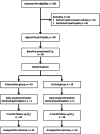TALKING TIME: A pilot randomized controlled trial investigating social support for informal caregivers via the telephone
- PMID: 32838773
- PMCID: PMC7446183
- DOI: 10.1186/s12913-020-05523-9
TALKING TIME: A pilot randomized controlled trial investigating social support for informal caregivers via the telephone
Abstract
Background: Caring for people with dementia at home requires considerable time, organization and commitment. Therefore, informal caregivers of people with dementia are often overburdened. This study examined the effects of the telephone-based Talking Time intervention, which is an approach used to strengthen the psychological health-related quality of life (HRQoL) and social support of informal caregivers of people with dementia living at home.
Methods: This study was a Medical Research Council framework phase two randomized controlled trial. The intervention consisted of a preliminary talk, information booklet, six structured telephone-based support group meetings and a structured written self-evaluation of each support group meeting. The control participants performed their usual individual self-organized care. After completing the data collection, the control group received the Talking Time intervention for fidelity reasons. The primary outcome was the self-rated psychological HRQoL of the informal caregivers, which was measured with the mental component summary of the General Health Survey Questionnaire Short Form 12 (SF-12).
Results: Thirty-eight informal caregivers and their relatives were included and allocated to the intervention or control groups (n = 19 each). After 3 months, the Talking Time intervention group demonstrated an increase in the self-rated psychological HRQoL scores, whereas the scores decreased in the control group. However, the standardized effect size of 1.65 (95% Confidence Interval, - 0.44 - 3.75) was not significant. Additionally, the secondary outcomes demonstrated no significant results. The differences between the groups in most outcomes were in the expected direction. No adverse effects were identified due to the intervention.
Conclusions: The Talking Time intervention is feasible and shows nonsignificant promising results with regard to the self-rated psychological HRQoL. After further adjustment, the intervention needs to be evaluated in a full trial.
Trial registration: Clinical Trials: NCT02806583 , June 9, 2016 (retrospectively registered).
Keywords: Dementia; Health-related quality of life; Informal caregivers; Psychosocial interventions; Social support; Telephone-based intervention.
Conflict of interest statement
All authors declare that they have no competing interests. MND is a member.
of the BMC Health Services Research editorial board, but was not involved in the review process.
Figures
References
-
- WHO. Dementia: A public health priority. Geneva; 2012.
-
- Schneekloth U, Wahl H-W. [Autonomy and need of help for older people in private homes: care arrangements, dementia, care offerings] Selbständigkeit und Hilfebedarf bei älteren Menschen in Privathaushalten: Pflegearrangements, Demenz, Versorgungsangebote, 2. Aufl. edn. s.l. ed: Kohlhammer Verlag; 2008.
-
- Pinquart M, Sorensen S. Differences between caregivers and noncaregivers in psychological health and physical health: a meta-analysis. Psychol Aging. 2003;18(2):250–267. - PubMed
-
- Dam AE, de Vugt ME, Klinkenberg IP, Verhey FR, van Boxtel MP. A systematic review of social support interventions for caregivers of people with dementia: are they doing what they promise? Maturitas. 2016;85:117–130. - PubMed
Publication types
MeSH terms
Associated data
LinkOut - more resources
Full Text Sources
Medical



